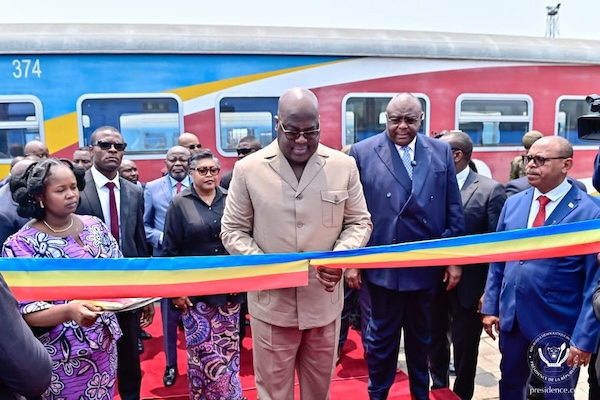Kinshasa-Matadi line will restart next week with multiple weekly trains, part of broader transportation revival
Key Highlights:
• Kinshasa–Matadi rail service resumes after a five-year halt, improving goods transport and reducing congestion on National Route n°1.
• Urban commuter links upgraded, with new self-propelled coaches and expansions on the Gare Centrale–N’Djili Airport and Kinshasa–Kasangulu lines.
• Future expansion planned, including a Banana–Boma–Matadi–Kinshasa corridor, while the Arise IIP modernization project remains on hold.
The Democratic Republic of Congo will restore rail service between its capital Kinshasa and the strategic port city of Matadi next week, ending a five-year suspension that forced millions of tons of cargo onto congested roads.
Transport Minister Jean-Pierre Bemba announced the resumption on September 5 at a ceremony led by President Félix Tshisekedi, marking a significant step in the government's efforts to revitalize the country's rail network.
The restored service promises to ease a major logistical bottleneck. Matadi's port handles four million tons of goods annually, and the lack of rail transport has forced virtually all cargo onto National Route No. 1, creating severe congestion along the critical Kinshasa–Central Kongo corridor. Officials expect the rail line to significantly improve cargo flow while reducing road traffic.
The revival extends beyond freight. Urban passenger services will also restart, including a new line connecting Gare Centrale to N'Djili International Airport, currently under construction. Once complete, the airport link will cut travel time to under 30 minutes, offering relief to the capital's chronic traffic problems. The government also plans to relaunch the Gare Centrale–Kitambo Magasin route, while the Kinshasa–Kasangulu connection already operates with two daily trains to meet growing commuter demand.
Infrastructure improvements support the expansion. The state railway operator ONATRA acquired seven new self-propelled passenger coaches in 2023, including four modern units, two intermediate cars, and an air-conditioned VIP carriage. These join an existing fleet of five locomotives, 77 freight wagons, 27 passenger cars, and 42 container wagons. Additional equipment—five locomotives and 40 container wagons—will arrive soon, financed through the Redevance Logistique Terrestre, a fund created to support the revival of the national railway company SNCC.
The government has completed stabilization work on the Kinshasa–Matadi track, though officials have not disclosed the project's cost or financing details.
Looking ahead, authorities are studying a 150-kilometer extension that would connect the deep-water port of Banana to the existing network via Boma. This proposed Banana–Boma–Matadi–Kinshasa corridor would create an unbroken rail connection between the country's main ports, potentially transforming goods transport across the region.
The rail revival comes amid questions about a larger modernization plan. In February 2024, the Council of Ministers approved a $956 million public-private partnership with Indian conglomerate Arise to rehabilitate and operate the line through a joint venture 40% owned by ONATRA and 60% by Arise IIP. The three-phase project has shown no visible progress since the initial announcement, leaving the scope and timeline of broader improvements unclear.
Ronsard Luabeya










